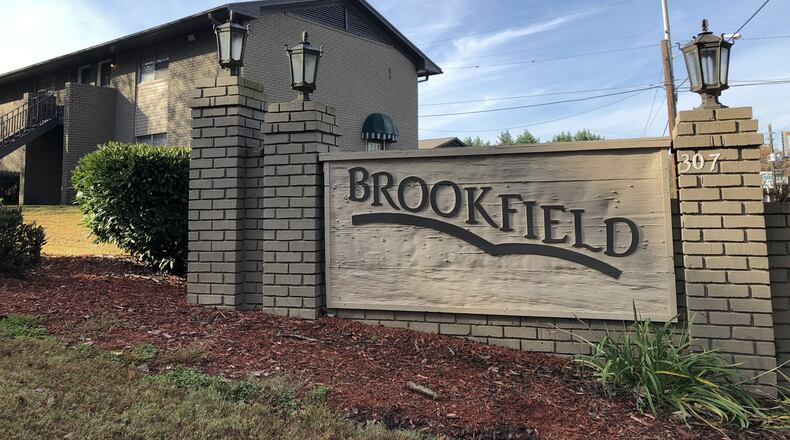It took a prosecution, days of court testimony, three court orders, and at least tens of thousands of dollars in attorneys expenses to convince the owners of East Point’s Brookfield Apartments to make it a safer place to live.
Yet when all was said and done, the security measures a judge ordered were not all that different from ones that other apartments use voluntarily. Brookfield hired police to provide overnight security, fixed lighting, and allowed two officers to live there for free.
Dangerous, high-crime apartment complexes can be extremely difficult to make safer, even though the fixes are simple.
In theory, the consequences for owners who fail to make their apartments safer can be high. Georgia law paved the way for metro Atlanta juries to award victims of violent crime tens of millions of dollars after their landlords failed to combat known crime problems. East Point has a nuisance ordinance that allows for civil prosecution in municipal court and fines of up to $1,000 per day, although such prosecutions are rare, experts said.
But time and again, tenant advocates find that the threat of lawsuits and nuisance actions cannot convince certain landlords to improve security. Most attorneys won’t take on a client who is a victim of more common crimes such as repeat burglaries or car thefts because too little money can be made for suing over a non-violent attack, experts said. All they can win is the cost of the damaged or stolen property.
Residents are left to fend for themselves.
“For the regular person who lives in fear of crime around them, there’s not a lot there,” said Wingo Smith, an attorney with Atlanta Legal Aid Society. “I think Georgia law has a strong presumption that you can just move.”
A management problem
The low-slung Brookfield Apartments on Washington Road may be one of the smaller complexes in East Point, but for three years, it had the most 9-1-1 calls, said East Point City Solicitor Antavius Weems.
“Criminal trespasses, burglary, stolen cars, shots fried, robbery. It ran the gamut,” Weems said of the 120 garden apartments, which were built in 1967. Managers rented out rooms under the table and may have participated in some of the crime, he said. Police found violent gang members and other wanted criminals living at or frequenting the apartments.
These problems made Brookfield an example of a phenomenon that criminologists have noted since the 1980s.
Count the crime at any category of place, whether it be apartment complexes, bus stops or night clubs, and you’ll find that many of those locations have no crime. A few will have a little. A small fraction of them will have a huge amount, said John Eck, a University of Cincinnati criminologist.
What makes these high-crime places different isn’t the neighborhood, the age of the buildings, or a host of other factors, Eck said. It’s management.
“There are some property owners who for one reason or another seem to have business models that generate crime or allow crime to happen,” Eck said.
Usually, the solution is no mystery. Reducing crime at an apartment complex can be as easy as screening tenants or requiring a lease. In a 1998 study on apartments with drug problems in San Diego, the biggest crime reductions took place at apartments where police met with managers to discuss and implement crime prevention strategies. Those managers became more likely to take the basic security precaution of evicting drug dealers.
“Its not just ‘not rocket science’,” Eck said. “It’s incredibly simple.”
Even so, making these changes take place is difficult. Weems used city nuisance ordinances to prosecute Brookfield, its owners, and mangers in August 2017, yet the apartment continued to rack up nuisance violations until January, when a judge found the defendants guilty and ordered new security measures.
“The court is concerned that it attempted on several occasions to give the defendants an opportunity to address the concerning behavior prior to issuing a ruling, all to be met with continued willful contemptuous behavior on the part of some of the defendants,” East Point municipal judge Glen Ashman wrote in his ruling.
Defendants appealed the ruling in Fulton County Superior Court the next month. Representatives for Sunshine Property Management Group, which shares an address with the company that holds Brookfield Apartments, and its employees, did not return calls for comment. An attorney for defendant Pretas Dedvukaj who was jailed on a contempt of court count, said he had nothing to do with the violations and was swept up in the prosecution as he was in failed negotiations to take over as manager.
“My client is a scapegoat and he ended up spending two days in jail,” attorney Ralph Villani said. Dedvukaj’s appeal is ongoing.
Free help, few takers
Even providing free help can be a tough sell to troubled apartments.
In Gwinnett, after police found that nearly all the 9-1-1 calls in unincorporated areas near Lawrenceville and Duluth came from certain apartments, the department launched its free, voluntary Crime Free Multi-Housing Program there to help landlords make their properties safer. Many did not join on until the department sought help from the Atlanta Apartment Association, the multifamily industry's local trade organization.
“I got a lot of doors slammed in my face,” said Cpl. Humberto Garcia, who runs the program.
The program’s tactics are far from revolutionary, but it helped crime drop by as much as 50 percent at some locations, Garcia said. Police give managers a day of training, hold a meeting with residents, and survey the property for basic safety issues such as doors that are easy to kick in or poor lighting. Properties that complete the process receive a special safety certification they can advertise to prospective tenants.
But if ownership changes, the process starts again. This is happening more frequently in recent years as the average length an owner keeps an apartment complex shortens to three to five years, Garcia said. Gwinnett Police have had to rescind the certifications of properties that don’t keep up their end of the bargain.
“If that property sells and the new owner has completely different ideas on how to run a business, it’s kind of like us having to start all over with them,” Garcia said.
For now, East Point’s Brookfield Apartments remain in compliance with the judge’s order, said Weems. Sunshine and its employees dropped their appeals in July, when a judge acknowledged that owners hired a security expert, found a new property manager, and improved the lighting beyond what the court required. Its settlement dropped their charges and allowed the complex to hire less-expensive private security guards.
But if trouble arises, Brookfield’s owners are required to meet with city officials to discuss it in good faith. And if they sell the apartments, they must notify the city.
About the Author
Keep Reading
The Latest
Featured




